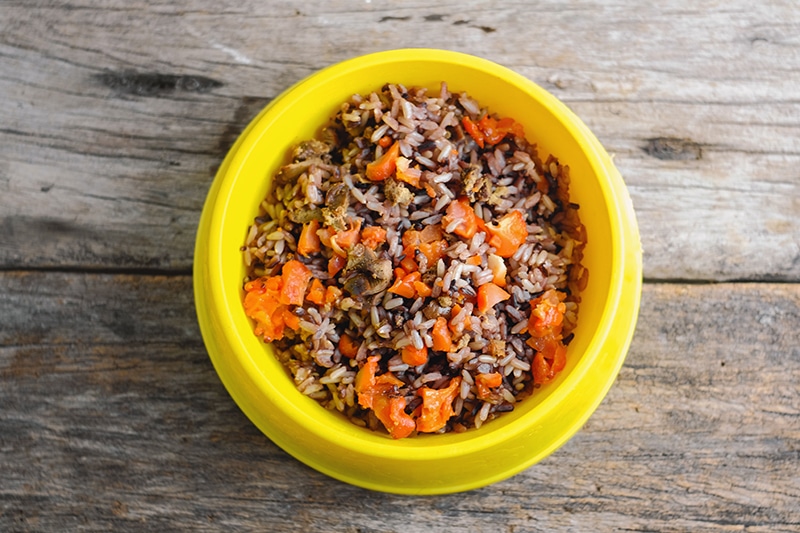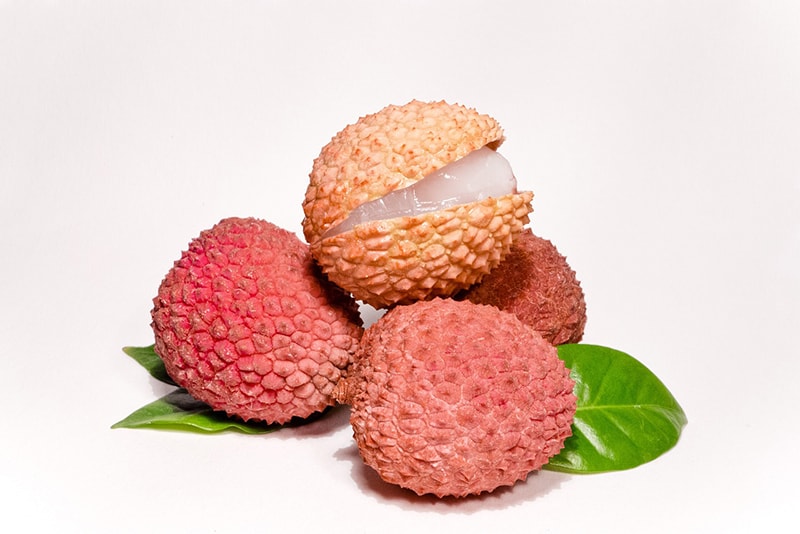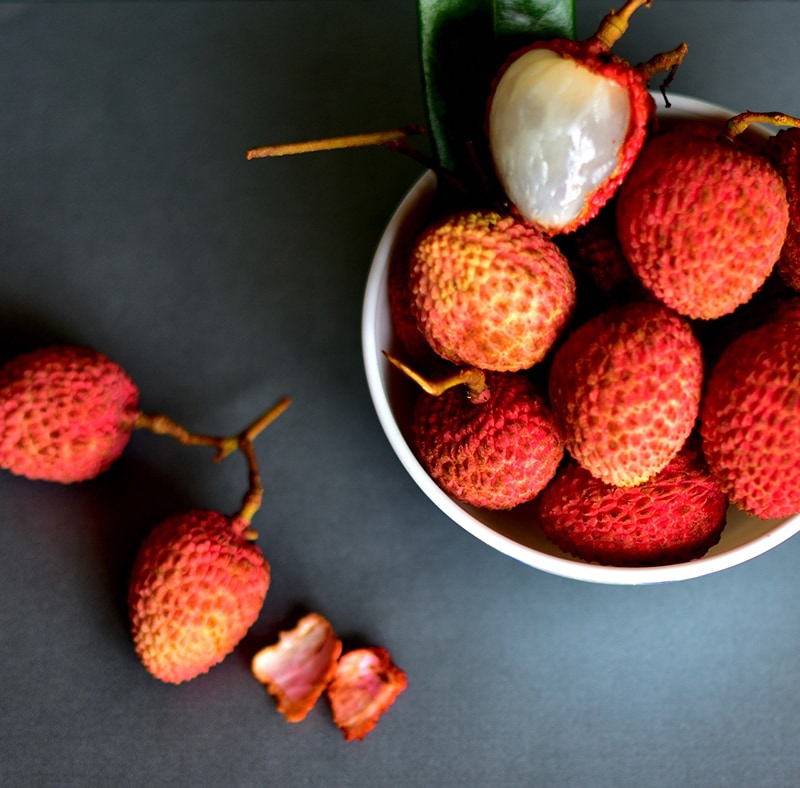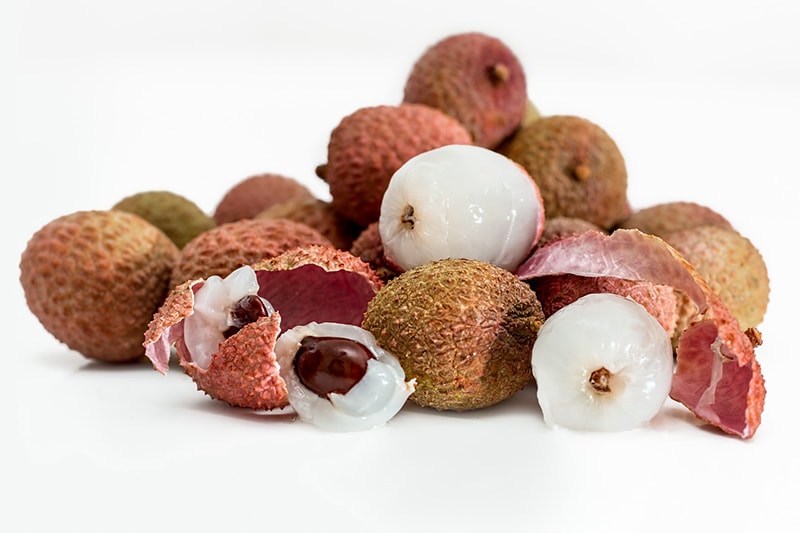[ad_1]

If you like consuming lychees and are a dog parent, you may be wondering if it’s safe for your dog to eat lychee too. While dogs should typically stick to regular dog food, giving a lychee to your dog from time to time won’t cause any harm. However, there are a few things to keep in mind before offering this fruit as a treat to your furry friend.
Read on to learn more about dogs eating lychee, including what a proper dog diet should look like, and familiarize yourself with lychee nutrients, how this fruit can affect your canine, and its benefits and drawbacks.

What Should a Healthy Dog Diet Look Like?
A balanced dog diet needs to include:1
Canines are facultative carnivores, so they can get these nutrients from meat-based and plant-based foods, which is why they need a well-balanced diet. Most of the time, dogs eat meat, but their diet can also include fruits and veggies.

What Is Lychee?
Lychee, also known as the alligator strawberry, is a tropical fruit native to China. This fruit has red, round, and bumpy skin, and its taste is a mixture of sweet and floral flavors.
Although this plant is native to China, lychee is also common in warmer parts of the U.S.A., such as Hawaii and Florida. It can be found in other regions across the world too, including:
You can purchase this fruit fresh, dried, or canned.
Lychee Nutrients
Since lychee is a fruit, it contains high sugar and carbohydrate levels and is low in protein and fat. Here’s a list of nutrients per a 100-gram (3.5-ounce) serving of fresh lychee fruit:
| Calories: | 68 kcal |
| Protein: | 83 grams |
| Fat: | 44 grams |
| Carbohydrates: | 16.5 grams |
| Dietary fiber: | 3 grams |
| Sugar: | 2 grams |
| Vitamin C: | 5 milligrams |
Lychee also contains high levels of vitamin C and has dietary fiber, which can be good for dogs.

Does Lychee Provide Nutritional Benefits for Dogs?
Lychee does provide a few nutritional benefits for dogs, as it has fiber and a range of vitamins and minerals.
However, you should only provide lychee to your furry friend as an occasional treat because it doesn’t contain enough protein and fats but has high sugar levels.
High Vitamin C Levels
Most dogs produce their own vitamin C,2 but occasional supplementation of this vitamin may offer various health benefits. Your veterinary surgeon will let you know if vitamin C supplementation is recommended for your dog.
Vitamin C is a powerful antioxidant and helps reduce inflammation, cognitive aging, and the number of free radicals in your dog’s body. So, giving fruits like lychee to your dog from time to time can benefit their health.
However, consuming too much lychee might also cause stomach problems and lead to diarrhea due to too much vitamin C in your dog’s body.
Not Enough Protein and Fats
A balanced dog diet includes proteins, fats, carbohydrates, vitamins, minerals, and water. Therefore, you should provide your canine with a diet that contains both meat- and plant-based products.
As lychee is low in protein and fats, it should only be an occasional treat.
High Sugar Levels
Consuming foods with high sugar levels is not beneficial for your dog in any way. In most cases, providing these foods to your furry friend will eventually lead to various health issues.
Sugar is not toxic to dogs, but it is very unhealthy, so you should try to keep it out of your dog’s diet. Dogs that consume more high-sugar foods are frequently prone to problems like:

Can Dogs Eat the Whole Lychee Fruit?
If you do give lychee to your dog, there are a couple of things to keep in mind. First, only provide lychee after removing its skin and seed. Your dog shouldn’t consume these because they have no benefits and could potentially be dangerous.
Second, always ensure that the lychee is ripe before giving it to your furry friend. Unripe lychee fruits contain a toxin, methylene cyclopropyl-glycine, which is known to be fatal in humans but the risk is not clear in dogs.
Giving Lychee to Your Dog
Providing lychee to your furry friend does have a few positive sides:
The Disadvantages of Giving Lychee To Your Dog
Although lychee has a few benefits for canines, it also has drawbacks that you should consider before giving this fruit to your dog:

Is Lychee Healthy for Dogs?
Lychee is not necessarily healthy for dogs. It has high vitamin C levels and contains plenty of sugar, which could with repeated ingestion cause harm to your dog’s health. Possible problems that a dog can experience when consuming too much of any one food type are as follows.
Obesity
Obesity in dogs is a serious issue because it can cause further health problems for your furry friend, including:
Dogs typically become obese by frequently consuming more calories than their metabolism and lifestyle needs. So, you should look for any signs of obesity if you often give this fruit to your dog:
As obesity carries multiple risks, you should ensure that your dog has a healthy diet, preferably low in sugar, to prevent diseases and health issues.
Diabetes
Some dogs that consume too many fruits are more prone to diabetes. It represents a metabolism disorder in which the insulin and glucose metabolism are not functioning as they should. Common signs of diabetes in dogs include:
Diabetes is treatable, but you need to recognize its signs in your dog early to be able to prevent further health damage.

Is Lychee Safe for Dogs?
If your dog eats lychee every now and then, they shouldn’t have any negative reactions to the fruit. However, if you’re giving lychee to your dog, remember to do it in moderation and to take off the skin and the seed and ensure that the fruit is ripe.

Final Words
Dogs can eat lychee, but doing so can be a double-edged sword. If your dog consumes lychee in moderation, they won’t have any problems. However, eating too much lychee too frequently can lead to various health issues.
Featured Image Credit: Nicole Köhler, Pixabay

